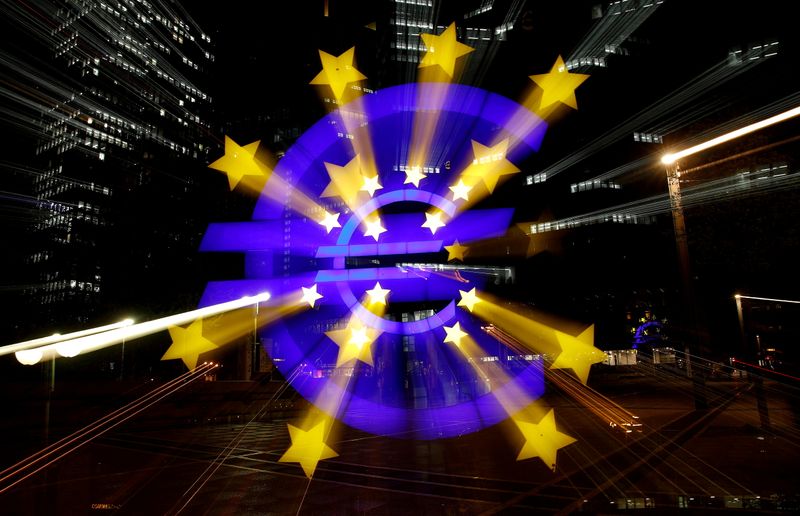By Dhara Ranasinghe and Stefano Rebaudo
LONDON/MILAN (Reuters) - Having weathered the COVID-19 crisis on the back of the ECB's 1.85 trillion-euro emergency stimulus package, the fragile bond markets of Italy, Spain, Portugal and Greece face a crucial stability test as the scheme approaches its final months.
The crisis-time programme, known as PEPP, allowed the European Central Bank more leeway in buying member states' bonds and complemented an existing but less flexible Asset Purchase Programme (APP) that has been in place since 2015.
But the PEPP, short for Pandemic Emergency Purchase Programme, expires in March. Unless it is extended, investors estimate the ECB must at least double APP purchase volumes or risk seeing borrowing costs spiral for the periphery - a term used to describe the poorer southern European euro zone states.
The ECB backstop allowed these countries to borrow and spend freely during the pandemic without being punished by markets. But the equilibrium is precarious; sudden fears of a 2022 ECB rate rise pushed Italian yields 13 basis points (bps) higher on Oct. 29, the biggest daily rise since April 2020.
"It won't be easy to deal with the end of PEPP in March and prevent a hawkish mistake," said Mauro Valle, head of fixed income at Generali (MI:GASI) Investments Partners, noting above-target inflation across the bloc.
ECB chief Christine Lagarde has said asset purchases would remain "important" after March, but hawkish ECB officials are already pushing for less generous bond-buying. Austria's Robert Holzmann, for instance, suggests net purchases could end next September, while Dutch central bank chief Klaas Knot said ending PEPP did not imply a step-up in APP.
That uncertainty may already be weighing; Italy's yield spread over Germany - essentially the risk premium investors demand to hold Italian debt - is up 20 bps in the past month to around 120 bps.
GRAPHIC: DE-ITspread https://fingfx.thomsonreuters.com/gfx/mkt/zjvqkwdowvx/Pasted%20image%201637158451807.png
That's far below the 300 bps-plus reached last March, before PEPP, but "peripheral spreads have probably gotten to the tightest levels they are going to get to", according to Timothy Graf, State Street (NYSE:STT)'s head of EMEA macro strategy.
Spanish 10-year bond yields are up 33 bps this year, the biggest rise since 2010 while the spread over Germany at 72 bps, is about 10 bps wider from month ago levels.
SUPPORT
There are reasons to believe the spread blowouts seen in March 2020 won't be repeated. For one, there is now an 800 billion-euro EU recovery fund which is disbursing hefty amounts in loans and grants to southern Europe.
Economies are recovering fast, credit ratings are improving and low yield levels will keep debt servicing risks in check.
GRAPHIC: Debt to GDP estimates, peripheral Europe vs Germany https://graphics.reuters.com/EUROPE-BONDS/egpbkablmvq/chart.png
Still, many are pessimistic the ECB can keep borrowing costs from rising once PEPP expires.
To keep hoovering up the majority of debt issuance, it would need to roughly double the size of monthly APP to an average 40-50 billion euros, according to calculations by several banks.
Unicredit (MI:CRDI) estimates the ECB must buy around 700 billion worth of assets in 2022 to keep financing conditions steady. That implies doubling APP to 500 billion euros between March and year-end.
While that would be less than the roughly 750 billion euros spent so far this year, Unicredit says that "given the mood at the ECB these days, a doubling of the APP to accompany the end of PEPP is just not a realistic prospect. A withdrawal of monetary stimulus over the next six months by the ECB is now baked."
In Italy, the most sensitive market, NatWest (LON:NWG) estimates 2022 bond issuance at minus 26 billion euros, net of ECB bond purchases and redemptions - versus this year's minus 88 billion euros.
There are two other risks.
First, APP lacks the flexibility of the PEPP. The latter allows the ECB to deviate from its "capital key" and buy bonds according to need rather than the size of the economy.
Second is the continued speculation over interest rates.
BofA fixed income strategist Erjon Satko said that if markets price two rate hikes next year, that would suggest an end to ECB bond-buying in mid-2022.
In that scenario, "even assuming an increase in the APP to 40-50 billion euros per month, the balance between supply and central bank net purchases will be positive, of around 150 billion euros in 2022", Satko said.
Money markets have scaled back bets on an ECB rate hike, no longer pricing a full chance of a 10 bps rate increase by December 2022, though the probability is still seen above 50%.

It would mean net bond supply could be positive next year for the first time since 2015, potentially a recipe for significant spread widening.
GRAPHIC: Life after PEPP https://fingfx.thomsonreuters.com/gfx/mkt/movanlbddpa/PEPP1711.PNG